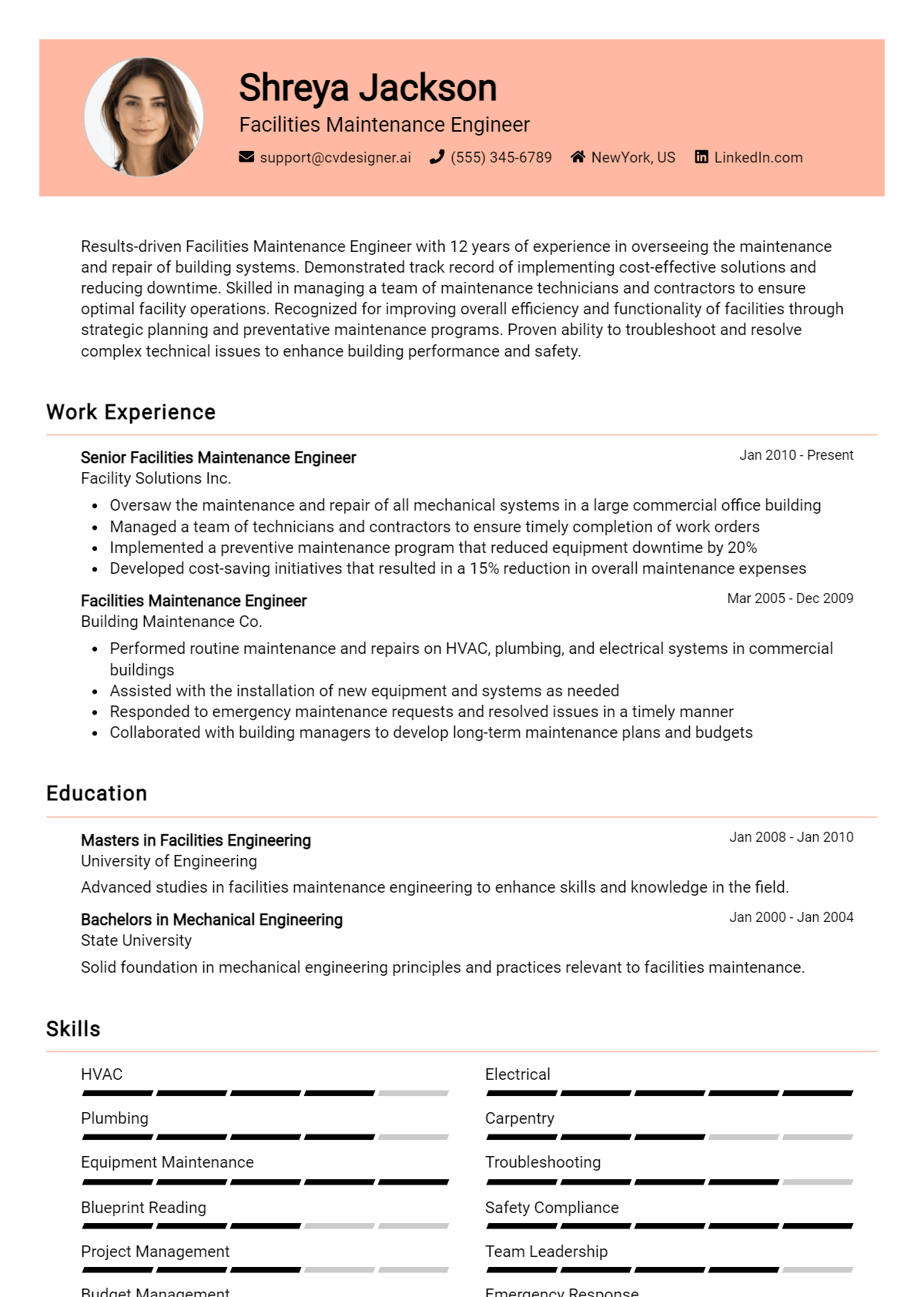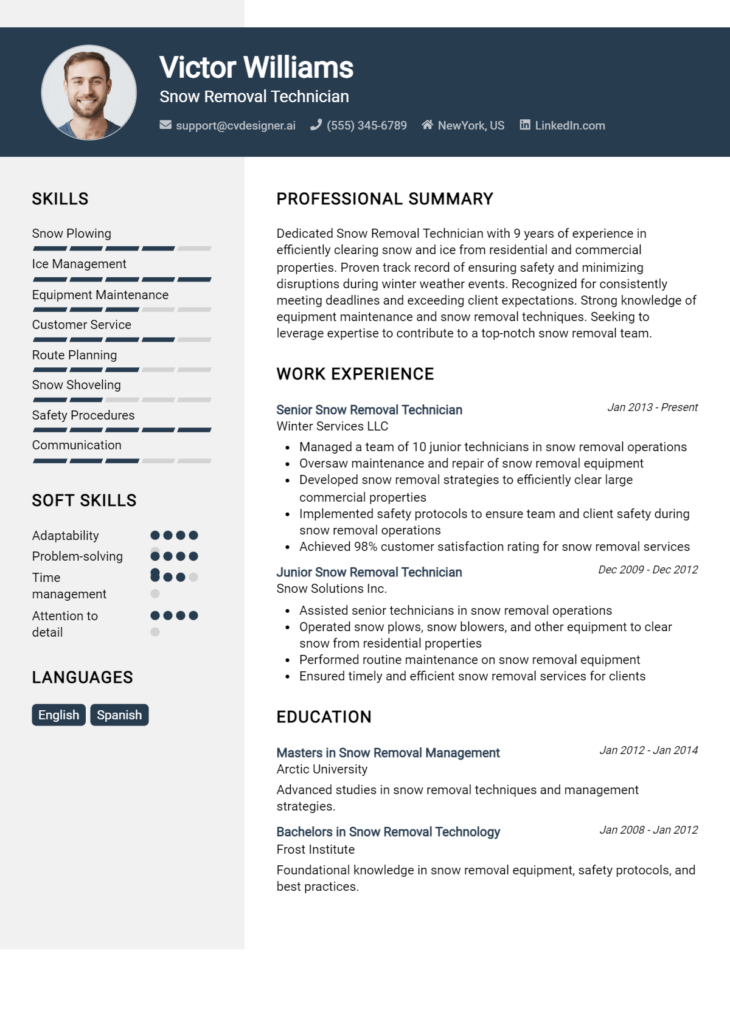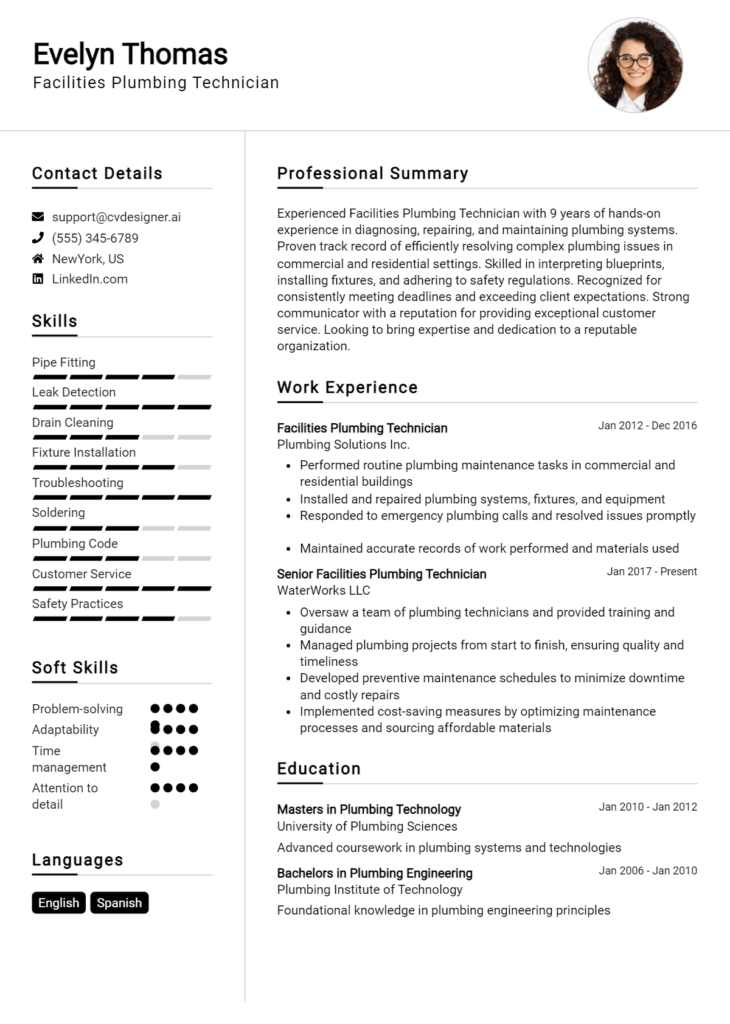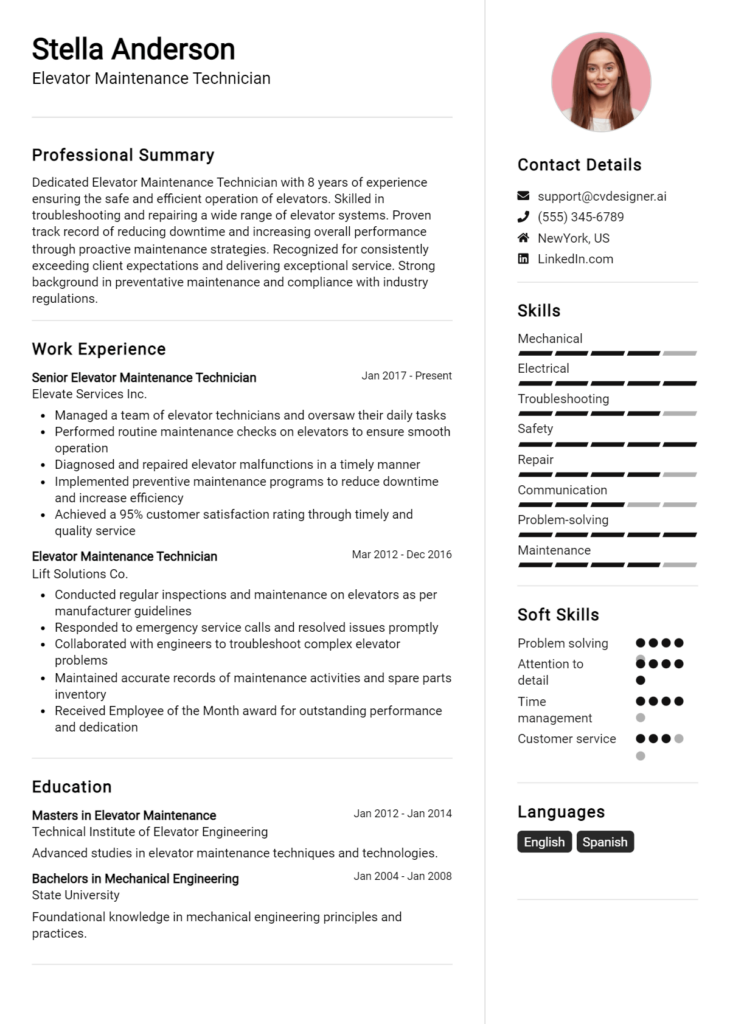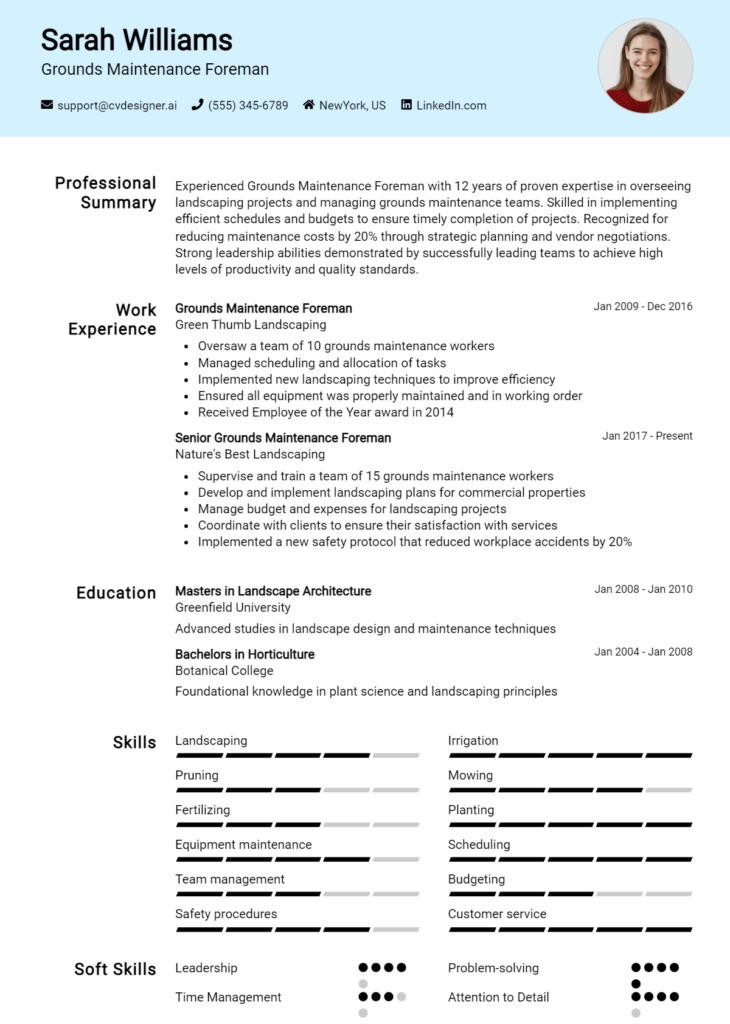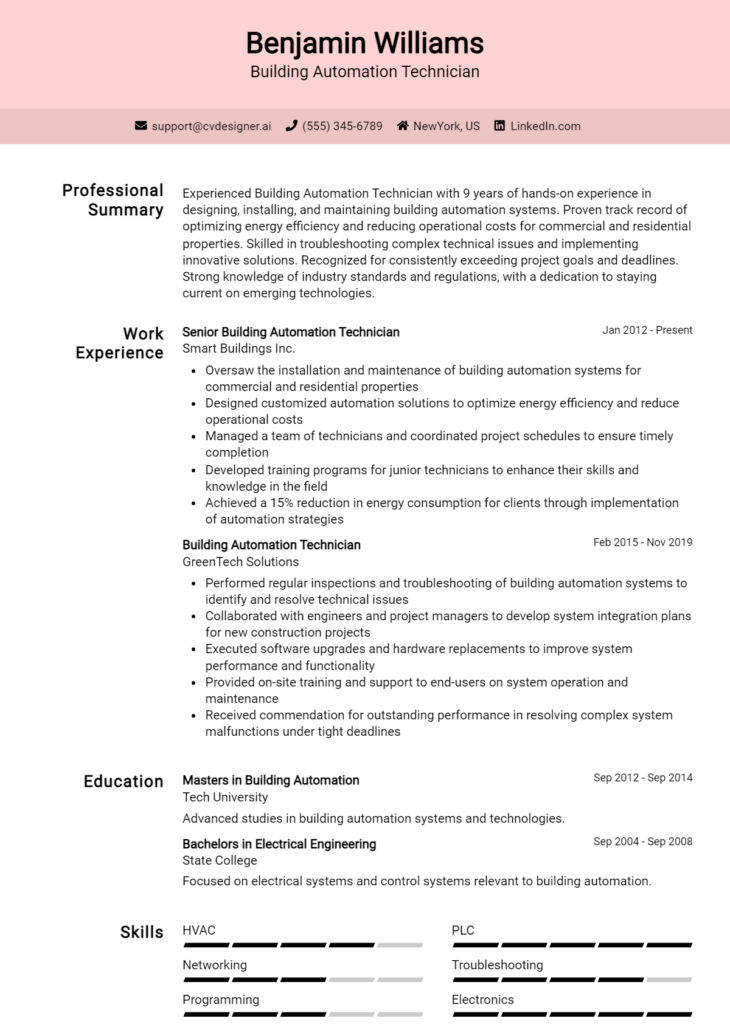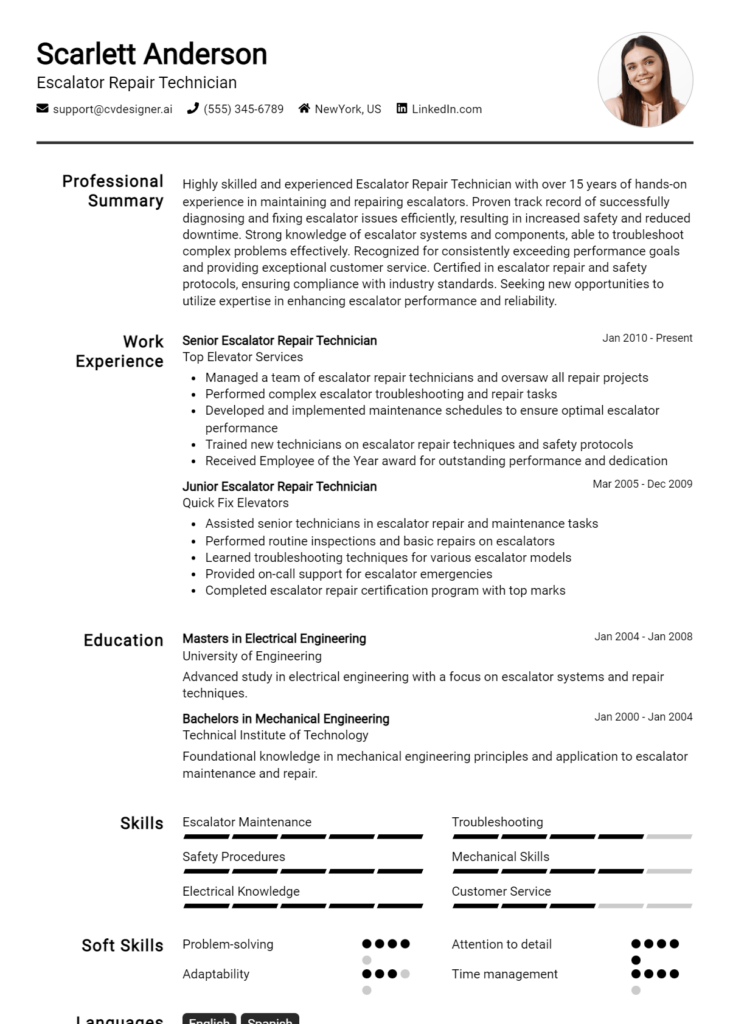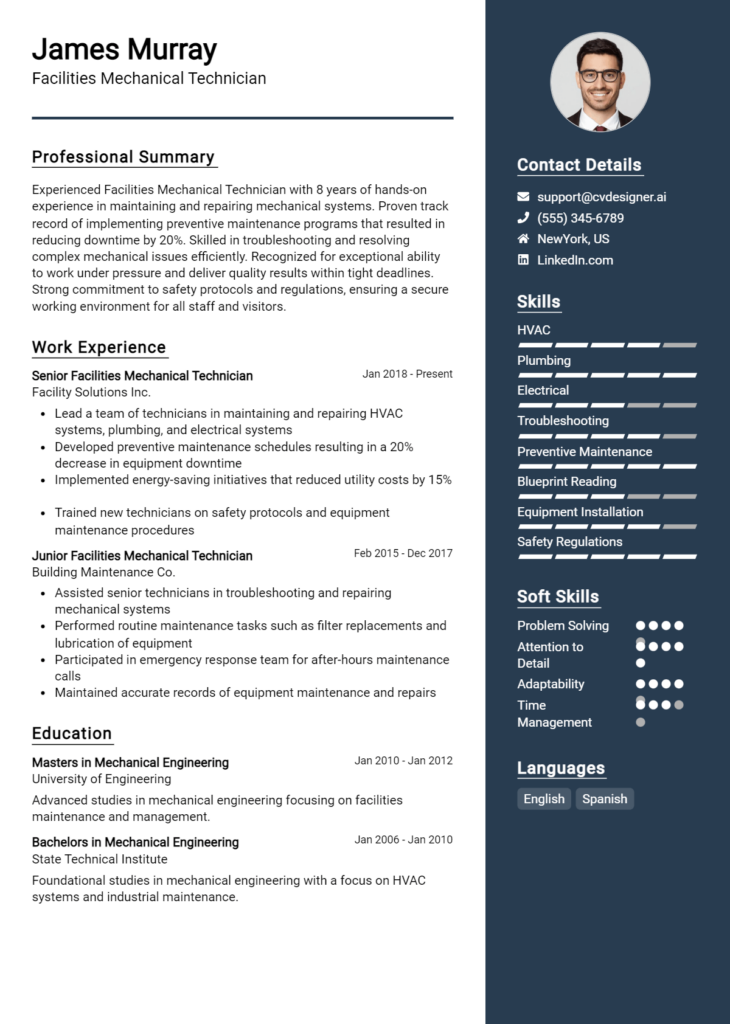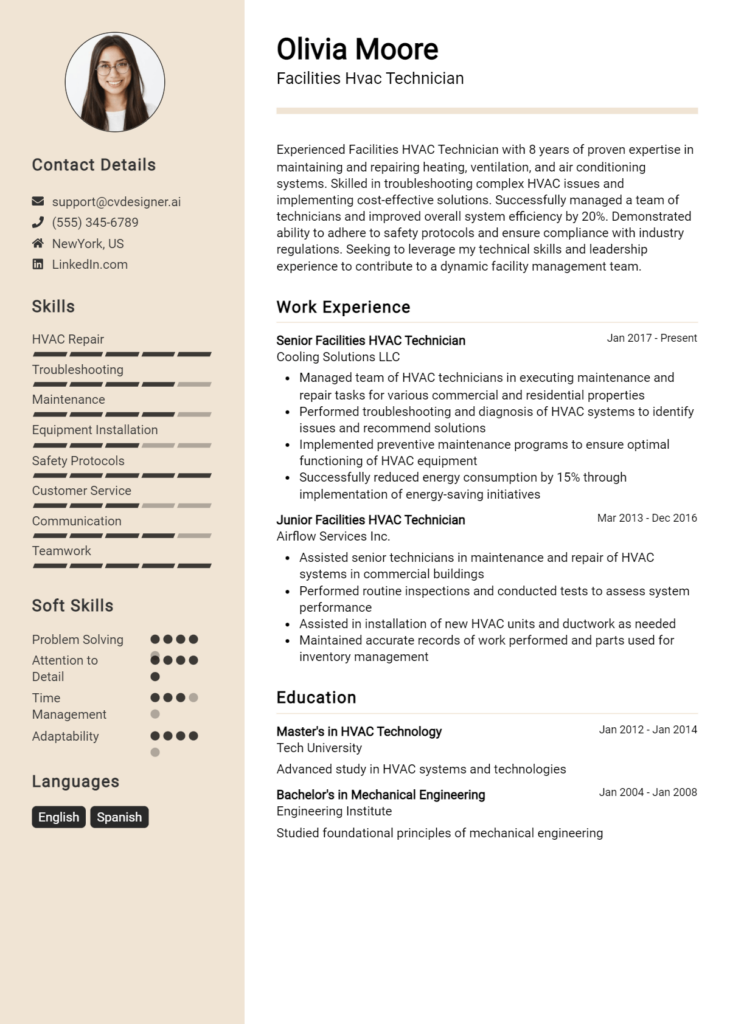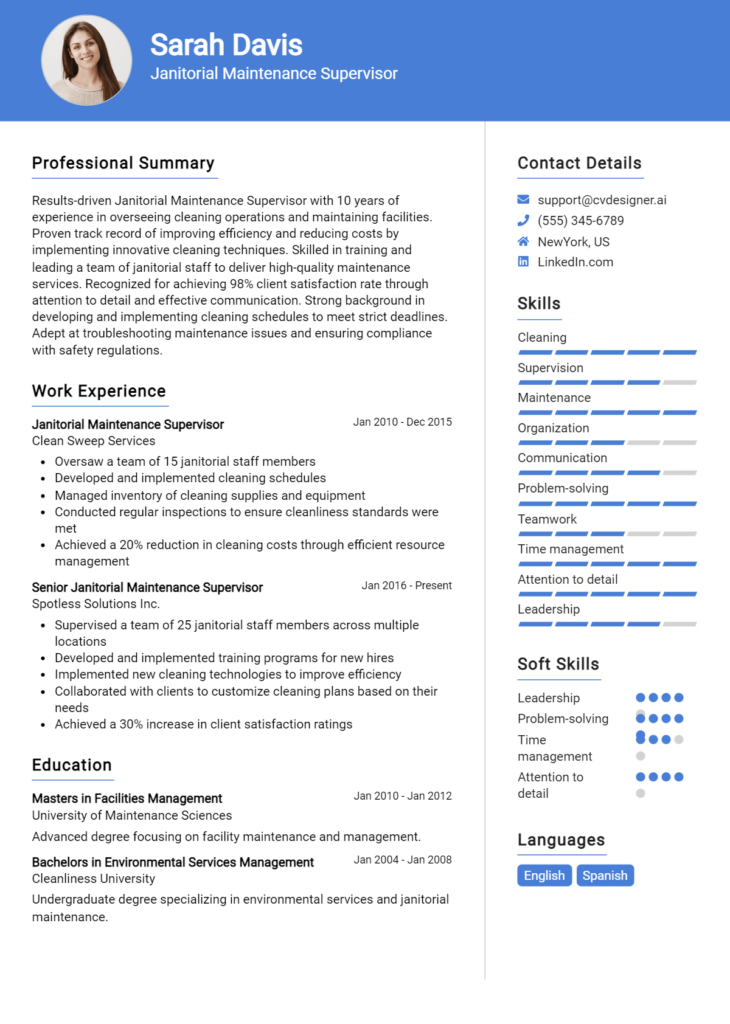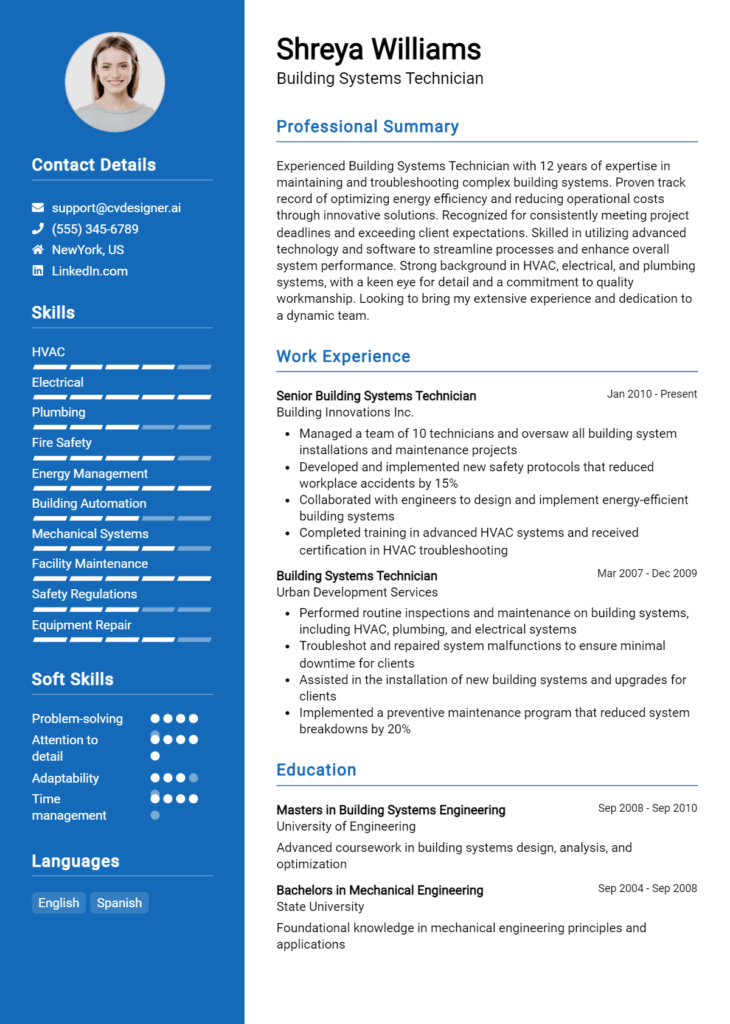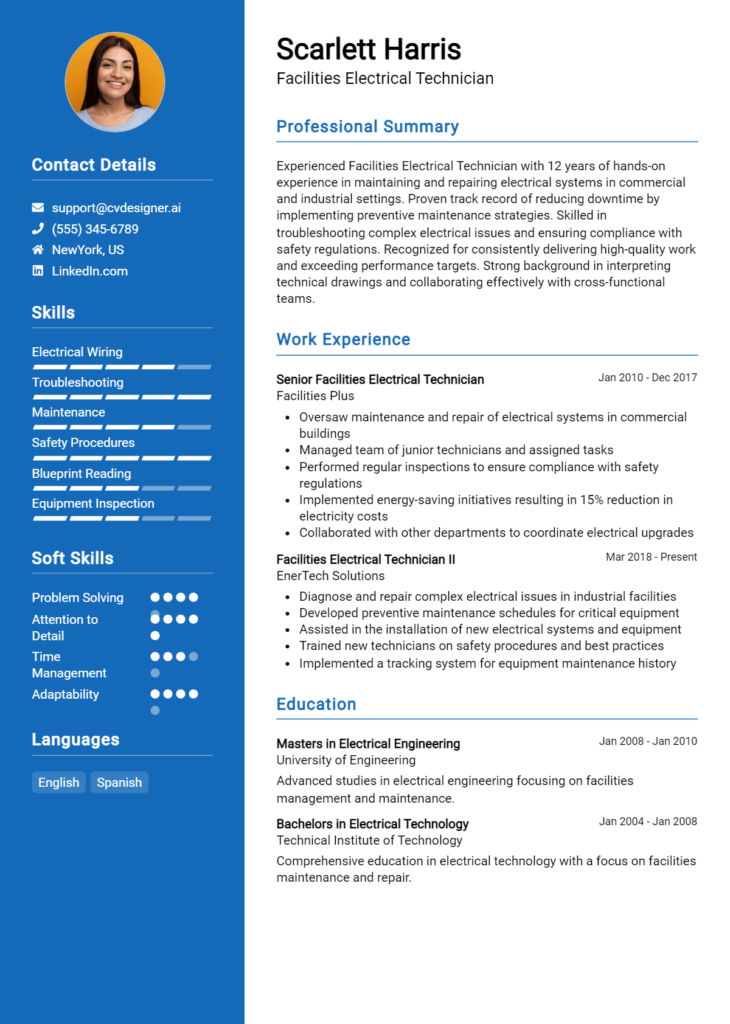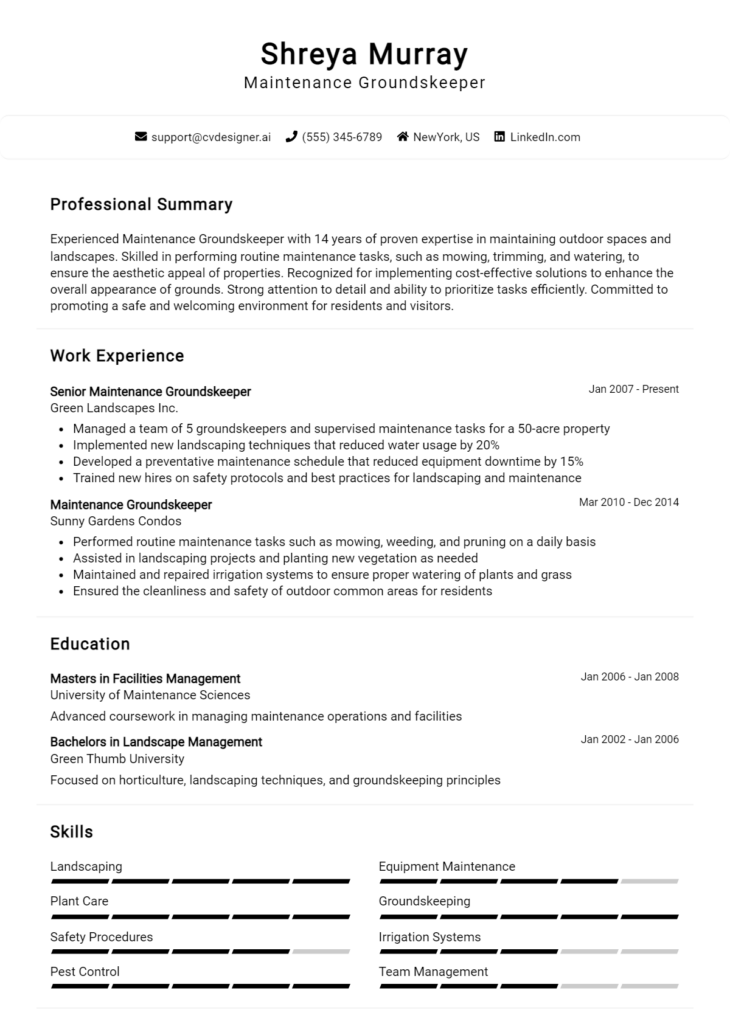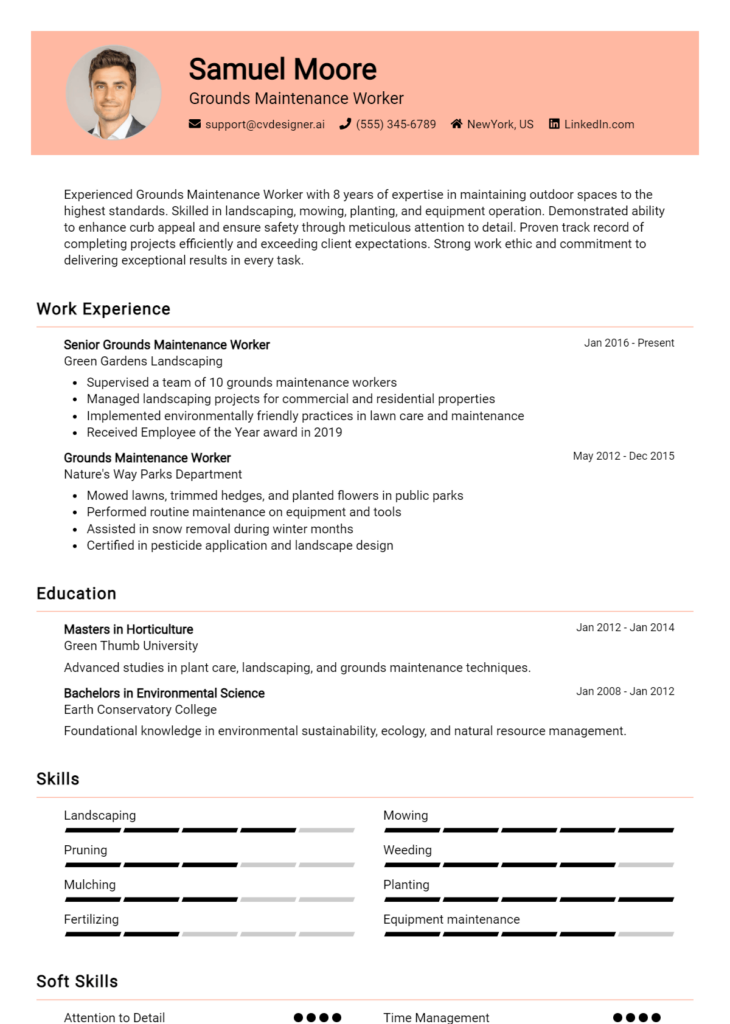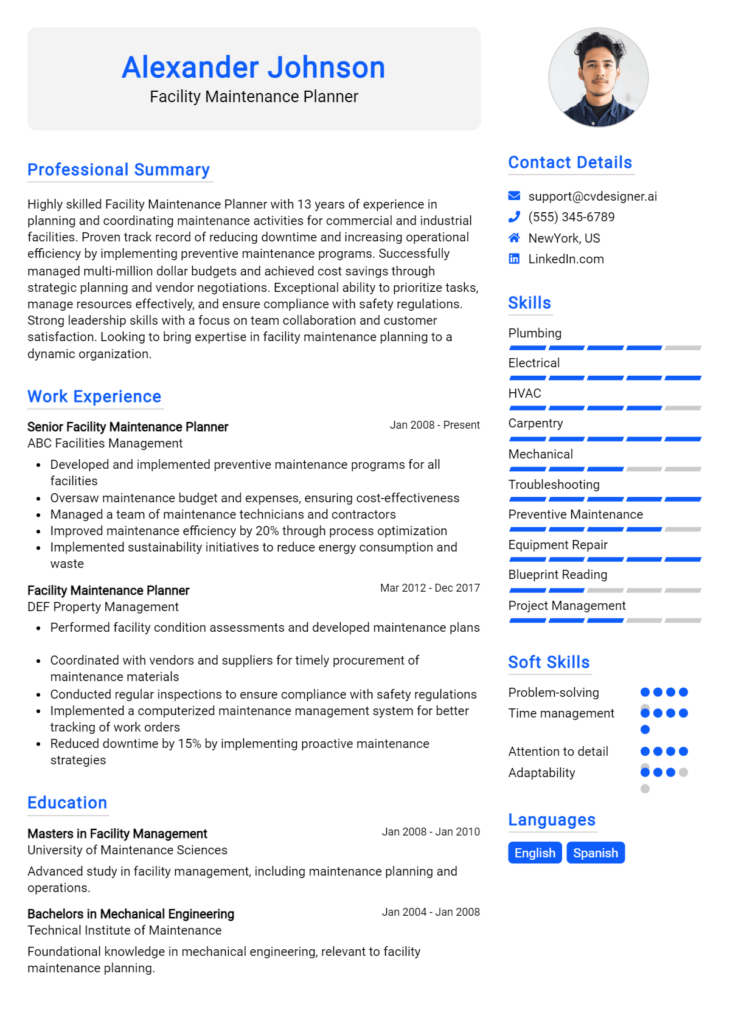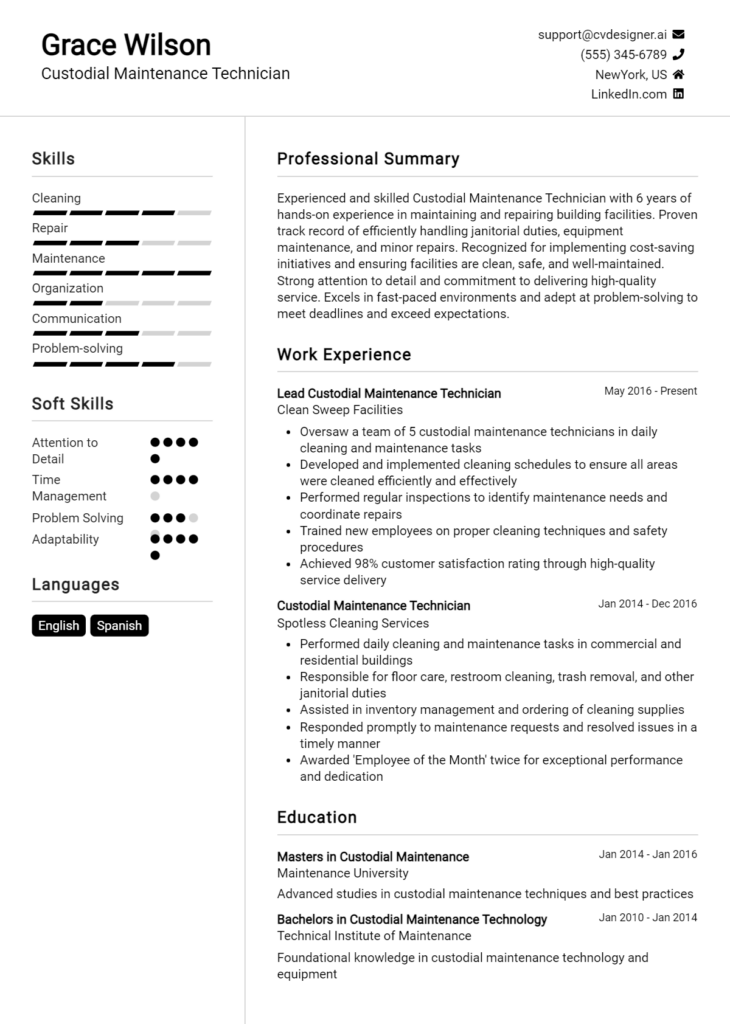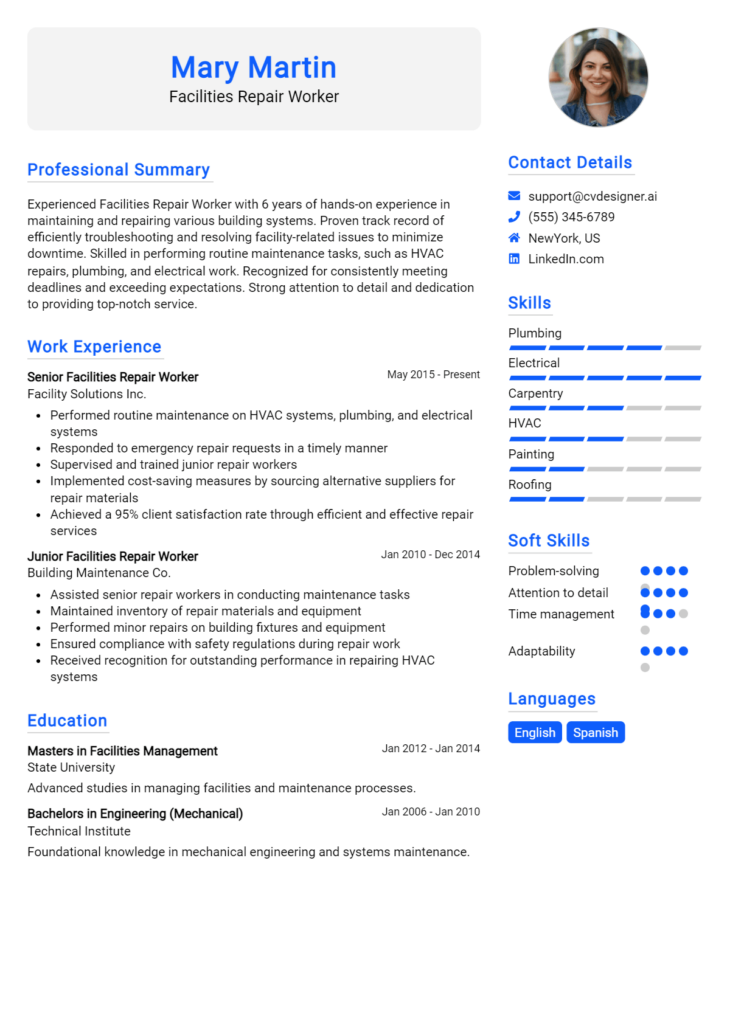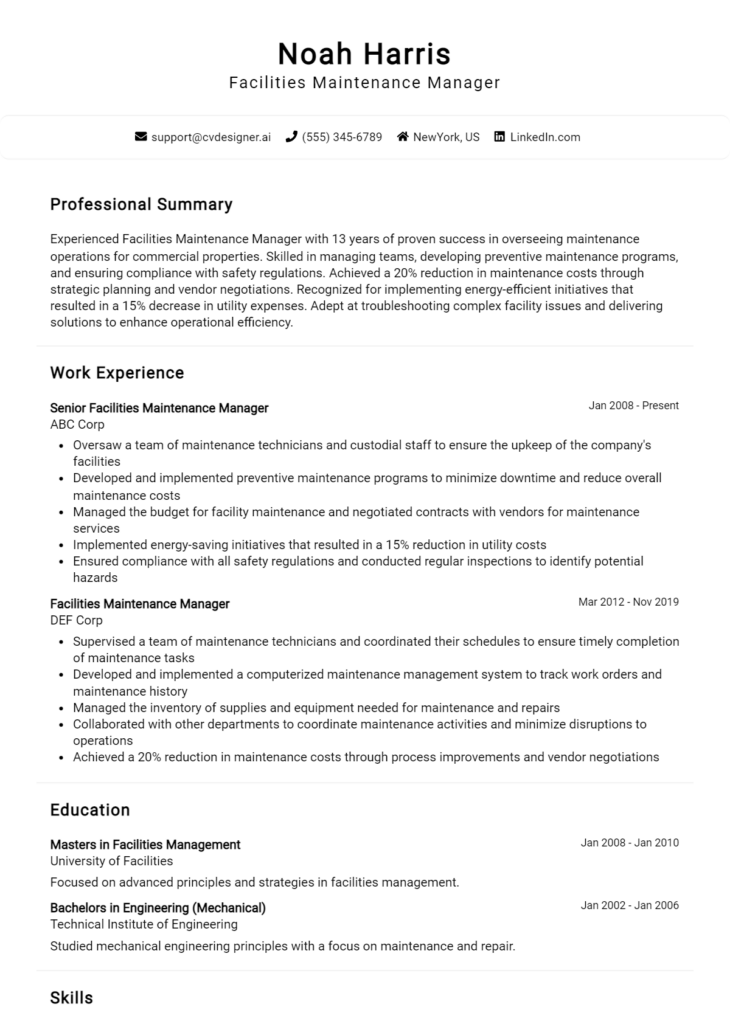Facilities Maintenance Engineer Core Responsibilities
A Facilities Maintenance Engineer plays a crucial role in ensuring the efficiency and functionality of an organization's facilities. Key responsibilities include performing routine inspections, managing repair projects, and coordinating with various departments to address maintenance needs. Technical skills in HVAC, plumbing, and electrical systems, along with strong problem-solving abilities, are essential for success. These competencies not only facilitate seamless operations but also align with the organization’s overall goals. A well-structured resume can effectively highlight these qualifications, demonstrating the engineer's value to potential employers.
Common Responsibilities Listed on Facilities Maintenance Engineer Resume
- Conduct routine maintenance inspections and assessments.
- Coordinate repairs and improvements with external contractors.
- Maintain records of maintenance activities and equipment status.
- Implement safety protocols and ensure compliance with regulations.
- Manage inventory of maintenance supplies and tools.
- Respond promptly to maintenance requests and emergencies.
- Collaborate with other departments to optimize facility operations.
- Perform troubleshooting and diagnostic tests on equipment.
- Prepare and manage maintenance budgets and forecasts.
- Train and supervise maintenance staff as needed.
- Research and recommend upgrades to improve facility efficiency.
- Assist in developing and implementing a facility maintenance plan.
High-Level Resume Tips for Facilities Maintenance Engineer Professionals
A well-crafted resume is crucial for Facilities Maintenance Engineer professionals, as it serves as the first impression a candidate makes on potential employers. In a field where technical know-how and hands-on experience are essential, your resume needs to effectively showcase not only your skills but also your notable achievements. It should tell the story of your career while aligning with the specific demands of the job you are applying for. This guide aims to provide practical and actionable resume tips tailored explicitly for Facilities Maintenance Engineer professionals, ensuring you stand out in a competitive job market.
Top Resume Tips for Facilities Maintenance Engineer Professionals
- Tailor your resume to match the job description by using relevant keywords and phrases.
- Highlight your relevant experience, focusing on roles that pertain directly to facilities maintenance.
- Quantify your achievements with specific metrics, such as reducing downtime by a percentage or managing a budget effectively.
- Emphasize industry-specific skills, including HVAC systems, electrical systems, plumbing, and safety regulations.
- Include certifications and licenses pertinent to facilities maintenance, such as OSHA training or HVAC certification.
- Showcase problem-solving skills by detailing specific challenges you’ve overcome in previous roles.
- Incorporate a professional summary at the top that encapsulates your experience and career goals.
- Utilize action verbs to convey your responsibilities and accomplishments dynamically.
- Keep the format clean and professional, ensuring it is easy to read and visually appealing.
- Proofread meticulously to avoid errors, as attention to detail is vital in facilities maintenance roles.
By implementing these tips, you can significantly enhance your chances of landing a job in the Facilities Maintenance Engineer field. A well-structured and impactful resume will not only capture the attention of hiring managers but also effectively communicate your qualifications and readiness to contribute to their team.
Why Resume Headlines & Titles are Important for Facilities Maintenance Engineer
In the competitive field of Facilities Maintenance Engineering, a well-crafted resume headline or title serves as a critical first impression that can greatly influence hiring managers. A strong headline succinctly encapsulates a candidate's key qualifications, skills, and experience, instantly grabbing attention and encouraging further exploration of the resume. It should be concise, relevant, and tailored specifically to the job being applied for, effectively summarizing what makes the candidate a perfect fit for the role. A compelling resume headline not only highlights the candidate's strengths but also sets the tone for the entire resume, making it essential for standing out in a pool of applicants.
Best Practices for Crafting Resume Headlines for Facilities Maintenance Engineer
- Keep it concise: Aim for a headline that is brief yet informative, ideally one to two lines.
- Be role-specific: Use keywords and phrases that are directly related to the Facilities Maintenance Engineer position.
- Highlight key strengths: Incorporate your most relevant skills or achievements to showcase your value.
- Use action-oriented language: Choose strong verbs and impactful phrases to convey confidence and capability.
- Avoid jargon: Ensure clarity and accessibility by using language that is easily understood by all readers.
- Tailor for each application: Customize your headline for each job application to align with the specific requirements of the position.
- Incorporate numbers or metrics: If applicable, include quantifiable achievements that demonstrate your impact in prior roles.
- Stay professional: Maintain a formal tone that reflects your professionalism and suitability for the engineering field.
Example Resume Headlines for Facilities Maintenance Engineer
Strong Resume Headlines
"Results-Driven Facilities Maintenance Engineer with 10+ Years of Experience in HVAC and Electrical Systems"
“Certified Facilities Maintenance Engineer Specializing in Energy Efficiency and Cost Reduction Strategies”
“Proven Expertise in Preventive Maintenance and Facility Operations for Large Commercial Properties”
Weak Resume Headlines
“Facilities Maintenance Engineer Looking for Work”
“Experienced Engineer”
The strong headlines are effective because they clearly communicate the candidate's experience, qualifications, and specific areas of expertise in a concise manner, making a lasting impression on hiring managers. In contrast, the weak headlines fail to capture attention due to their vagueness and lack of specificity, leaving hiring managers with little understanding of the candidate's qualifications or unique value proposition. A strong headline provides a clear advantage in a competitive job market, while weak headlines may lead to missed opportunities.
Writing an Exceptional Facilities Maintenance Engineer Resume Summary
A well-crafted resume summary is crucial for a Facilities Maintenance Engineer as it serves as the first impression to potential employers. This brief overview captures the essence of your professional identity, showcasing key skills, relevant experience, and significant accomplishments that align with the job role. A strong summary can quickly capture the attention of hiring managers, compelling them to read further into your qualifications. It should be concise, impactful, and tailored specifically to the job you are applying for, ensuring that you stand out among many candidates in a competitive field.
Best Practices for Writing a Facilities Maintenance Engineer Resume Summary
- Quantify Achievements: Use numbers and statistics to highlight your impact, such as maintenance cost reductions or efficiency improvements.
- Focus on Relevant Skills: Emphasize technical skills, problem-solving abilities, and any certifications that are particularly relevant to the job description.
- Tailor for the Job Description: Align your summary with the specific requirements and responsibilities outlined in the job posting.
- Keep it Concise: Aim for 2-4 sentences that provide a clear snapshot of your qualifications without overwhelming detail.
- Highlight Key Accomplishments: Mention specific projects or achievements that demonstrate your expertise and contributions to previous employers.
- Use Action Verbs: Start sentences with strong action verbs to convey confidence and proactivity in your role.
- Include Soft Skills: Don’t forget to touch on interpersonal skills like teamwork, communication, and leadership, which are valuable in a maintenance role.
- Maintain Professional Tone: Use industry-specific language that reflects your professionalism and knowledge of the field.
Example Facilities Maintenance Engineer Resume Summaries
Strong Resume Summaries
Results-driven Facilities Maintenance Engineer with over 7 years of experience in optimizing maintenance operations, reducing downtime by 30%, and saving over $100K annually through effective resource management. Proven expertise in HVAC systems, electrical repairs, and plumbing maintenance, complemented by a strong commitment to safety and compliance.
Dedicated Facilities Maintenance Engineer skilled in managing multi-site maintenance projects, achieving a 25% improvement in service response times. Adept at implementing preventive maintenance programs that increase equipment lifespan and enhance operational efficiency. Certified in OSHA safety regulations.
Highly organized Facilities Maintenance Engineer with a track record of successfully coordinating repairs and maintenance for facilities totaling over 500,000 square feet. Spearheaded initiatives that improved energy efficiency by 20%, resulting in significant cost savings for the organization.
Weak Resume Summaries
Facilities Maintenance Engineer with some experience in maintenance and repairs. I am a good team player and work well with others.
Looking for a position as a Facilities Maintenance Engineer where I can use my skills and knowledge in various maintenance tasks.
The examples provided illustrate the key differences between strong and weak resume summaries. Strong summaries are specific, quantifiable, and directly relevant to the role, highlighting measurable achievements and relevant skills. In contrast, weak summaries lack detail, are overly generic, and fail to convey the candidate's unique qualifications or impact in previous roles, making them less compelling to hiring managers.
Work Experience Section for Facilities Maintenance Engineer Resume
The work experience section of a Facilities Maintenance Engineer resume is pivotal in demonstrating a candidate's technical proficiency, leadership capabilities, and commitment to delivering high-quality results. This section not only highlights the candidate's hands-on experience with maintenance systems, repair processes, and safety protocols but also showcases their ability to manage teams effectively and work collaboratively with various stakeholders. By quantifying achievements and aligning experiences with industry standards, candidates can provide tangible evidence of their contributions, making a compelling case for their candidacy in a competitive job market.
Best Practices for Facilities Maintenance Engineer Work Experience
- Focus on specific technical skills relevant to facilities maintenance, such as HVAC systems, plumbing, and electrical work.
- Quantify achievements wherever possible, using metrics like cost savings, increased efficiency, and reduced downtime.
- Highlight leadership roles, including team management, project oversight, and cross-departmental collaboration.
- Use action verbs to describe responsibilities and achievements, showcasing proactivity and impact.
- Align experiences with industry standards and best practices to demonstrate familiarity with current trends and technologies.
- Include relevant certifications or training that enhance your technical qualifications and industry credibility.
- Tailor your work experience to the specific job description, emphasizing the most relevant experiences and skills.
- Provide context for your achievements to illustrate the challenges faced and the strategies employed to overcome them.
Example Work Experiences for Facilities Maintenance Engineer
Strong Experiences
- Led a team of 10 maintenance technicians in a facility overhaul project that reduced operational costs by 25% and improved system reliability by 40% within six months.
- Implemented a predictive maintenance program that decreased equipment downtime by 30%, resulting in a savings of $100,000 annually.
- Managed the installation of a state-of-the-art HVAC system, increasing energy efficiency by 15% and achieving compliance with new environmental regulations.
- Collaborated with cross-functional teams to design and execute an emergency response plan, improving incident response time by 50% during critical situations.
Weak Experiences
- Responsible for maintenance tasks at the facility.
- Worked with a team on various projects without specific outcomes or details.
- Assisted in repairs and maintenance activities.
- Participated in meetings regarding facility operations.
The examples provided demonstrate a clear distinction between strong and weak experiences. Strong experiences are characterized by specific achievements, quantifiable outcomes, and leadership roles that illustrate the candidate's impact on the organization. In contrast, weak experiences lack detail and measurable results, failing to convey the candidate's contributions or expertise effectively. By focusing on concrete accomplishments and responsibilities, candidates can significantly enhance their resumes and appeal to potential employers.
Education and Certifications Section for Facilities Maintenance Engineer Resume
The education and certifications section of a Facilities Maintenance Engineer resume is crucial as it serves to showcase the candidate's academic background and any industry-specific credentials. This section not only underscores the foundational knowledge acquired through formal education but also emphasizes the importance of certifications that validate the engineer's proficiency in specialized areas. Continuous learning, demonstrated through relevant coursework and specialized training, enhances credibility, signaling to potential employers that the candidate is committed to staying updated with industry standards and best practices. By effectively presenting this information, candidates can significantly align themselves with the specific requirements of the job role.
Best Practices for Facilities Maintenance Engineer Education and Certifications
- Highlight relevant degrees such as a Bachelor's in Engineering or a related technical field.
- Include industry-recognized certifications, such as Certified Maintenance & Reliability Technician (CMRT) or Facilities Management Professional (FMP).
- List any specialized training programs that are pertinent to facilities maintenance, such as HVAC systems or electrical safety.
- Provide details on relevant coursework that showcases expertise in areas like building systems, energy management, or safety protocols.
- Use clear formatting to make the section easy to read and navigate, ensuring quick access to key qualifications.
- Focus on recent educational achievements and certifications to reflect the candidate's current knowledge base.
- Tailor the content to match the specific job description and requirements of the Facilities Maintenance Engineer role.
- Consider including continuing education efforts to demonstrate commitment to professional development.
Example Education and Certifications for Facilities Maintenance Engineer
Strong Examples
- Bachelor of Science in Mechanical Engineering, ABC University, 2020
- Certified Maintenance & Reliability Technician (CMRT), 2021
- OSHA 30-Hour General Industry Safety and Health Certification, 2022
- Coursework in Building Automation Systems, XYZ Technical Institute, 2019
Weak Examples
- Associate Degree in Art History, DEF College, 2015
- Certification in Basic Computer Skills, GHI Institute, 2018
- High School Diploma, JKL High School, 2010
- Outdated HVAC Certification, 2010
The strong examples are considered relevant because they directly align with the requirements of a Facilities Maintenance Engineer, showcasing technical knowledge and industry-recognized credentials. In contrast, the weak examples illustrate qualifications that do not pertain to the field, such as unrelated degrees or outdated certifications, which do not enhance the candidate's suitability for the role. By focusing on relevant education and current certifications, candidates can effectively demonstrate their qualifications and commitment to the profession.
Top Skills & Keywords for Facilities Maintenance Engineer Resume
In the competitive field of facilities maintenance engineering, showcasing the right set of skills on your resume is crucial for capturing the attention of hiring managers. A well-crafted resume not only highlights your technical competencies and relevant work experience but also emphasizes the soft skills that make you a well-rounded candidate. Employers are looking for professionals who can not only perform technical tasks but also collaborate effectively, solve problems, and adapt to changing environments. By incorporating both hard and soft skills, you can present yourself as a versatile and valuable asset to any facilities management team.
Top Hard & Soft Skills for Facilities Maintenance Engineer
Soft Skills
- Communication: Ability to convey information clearly and effectively.
- Teamwork: Collaborating well with others in a multidisciplinary setting.
- Problem-Solving: Analyzing issues and developing effective solutions.
- Adaptability: Adjusting to new challenges and environments quickly.
- Time Management: Prioritizing tasks to meet deadlines efficiently.
- Attention to Detail: Ensuring accuracy and thoroughness in all tasks.
- Customer Service Orientation: Focusing on meeting client needs and expectations.
- Leadership: Guiding and motivating teams towards achieving goals.
- Critical Thinking: Evaluating situations logically and making informed decisions.
- Conflict Resolution: Managing disagreements and finding amicable solutions.
Hard Skills
- HVAC Systems Knowledge: Understanding of heating, ventilation, and air conditioning systems.
- Electrical Systems Maintenance: Proficiency in maintaining and troubleshooting electrical systems.
- Plumbing Skills: Expertise in plumbing installation and repair.
- Building Codes and Regulations: Knowledge of local building codes and safety regulations.
- Preventive Maintenance: Implementing scheduled maintenance to prevent equipment failures.
- Blueprint Reading: Ability to interpret technical drawings and schematics.
- Project Management: Skills in managing projects from initiation to completion.
- Inventory Management: Keeping track of supplies and maintenance materials.
- Mechanical Systems Understanding: Familiarity with mechanical systems and repair techniques.
- Safety Compliance: Ensuring safety protocols and procedures are followed.
By emphasizing these skills in your resume, alongside your work experience, you can effectively demonstrate your qualifications and readiness for a facilities maintenance engineer role.
Stand Out with a Winning Facilities Maintenance Engineer Cover Letter
Dear [Hiring Manager's Name],
I am writing to express my interest in the Facilities Maintenance Engineer position at [Company Name] as advertised on [where you found the job listing]. With a solid background in mechanical and electrical systems, coupled with my hands-on experience in facility management, I am confident in my ability to contribute effectively to your team and ensure the seamless operation of your facilities. My technical skills, combined with a proactive approach to problem-solving and a commitment to safety, make me a strong candidate for this role.
In my previous position at [Previous Company Name], I successfully managed the maintenance and repair of a diverse range of facilities, including commercial buildings and industrial sites. My responsibilities included conducting regular inspections, troubleshooting mechanical and electrical issues, and implementing preventive maintenance programs. I take pride in my ability to assess problems quickly and efficiently, leading to minimal downtime and increased operational efficiency. My experience working with cross-functional teams has also honed my communication skills, allowing me to articulate technical information clearly to non-technical stakeholders.
I am particularly drawn to the opportunity at [Company Name] because of your commitment to sustainability and innovation in facility management. I am eager to bring my expertise in energy-efficient systems and sustainable practices to your organization. I believe that my proactive maintenance strategies and my dedication to continuous improvement align perfectly with your company's goals. I am enthusiastic about the possibility of contributing to [Company Name] and helping to enhance the efficiency and functionality of your facilities.
Thank you for considering my application. I look forward to the opportunity to discuss how my skills and experiences align with the needs of your team. I am excited about the possibility of contributing to [Company Name] and am available for an interview at your earliest convenience.
Sincerely,
[Your Name]
[Your LinkedIn Profile or Personal Website]
[Your Phone Number]
[Your Email Address]
Common Mistakes to Avoid in a Facilities Maintenance Engineer Resume
When crafting a resume as a Facilities Maintenance Engineer, it's crucial to present your skills and experience effectively to stand out in a competitive job market. However, many candidates make common mistakes that can hinder their chances of landing an interview. By avoiding these pitfalls, you can create a compelling resume that highlights your qualifications and showcases your expertise in facilities maintenance.
Lack of Specificity: Vague language can dilute your accomplishments. Instead of saying "responsible for maintenance," specify what systems you managed or improved, such as HVAC, electrical, or plumbing systems.
Ignoring Keywords: Many employers use Applicant Tracking Systems (ATS) to screen resumes. Failing to include relevant keywords from the job description can lead to automatic rejection.
Overloading with Technical Jargon: While it's important to demonstrate technical knowledge, excessive jargon can confuse hiring managers who may not have a technical background. Aim for a balance that is both informative and accessible.
Inconsistent Formatting: A cluttered or inconsistent layout can make your resume difficult to read. Use uniform fonts, bullet points, and spacing to ensure clarity and professionalism.
Neglecting Soft Skills: Facilities Maintenance Engineers need strong communication and teamwork skills. Focusing solely on technical abilities can give an incomplete picture of your qualifications.
Omitting Relevant Certifications: Certifications such as HVAC, plumbing, or electrical safety can enhance your resume. Make sure to highlight these credentials prominently.
Failing to Quantify Achievements: Use numbers to demonstrate your impact, such as "reduced energy costs by 20% through system upgrades" or "managed a team of five maintenance technicians."
Not Tailoring Your Resume: Sending the same resume for every application can be detrimental. Customize your resume to align with the specific job requirements and company culture for each position you apply for.
Conclusion
As a Facilities Maintenance Engineer, your role is critical in ensuring the functionality and safety of buildings and their systems. Key responsibilities include performing routine maintenance, troubleshooting issues, managing repair projects, and ensuring compliance with safety regulations. Additionally, your technical skills in HVAC, plumbing, electrical systems, and general building maintenance are essential for success in this position.
Given the diverse skill set and experience required, it’s vital to present your qualifications effectively. A well-structured resume can make a significant difference in your job search. Take the time to review and refine your Facilities Maintenance Engineer resume to highlight your strengths and relevant experiences.
To assist you in this process, consider utilizing various resources available online. You can find a wide range of resume templates to help format your information professionally. If you prefer a more customized approach, try the resume builder for a step-by-step guide to creating your resume. For inspiration, explore resume examples that showcase successful Facilities Maintenance Engineers. Additionally, don’t overlook the importance of a compelling cover letter; check out the available cover letter templates to make your application stand out.
Now is the time to take action! Review your resume, utilize these tools, and ensure you present yourself as the ideal candidate for your next Facilities Maintenance Engineer role.

